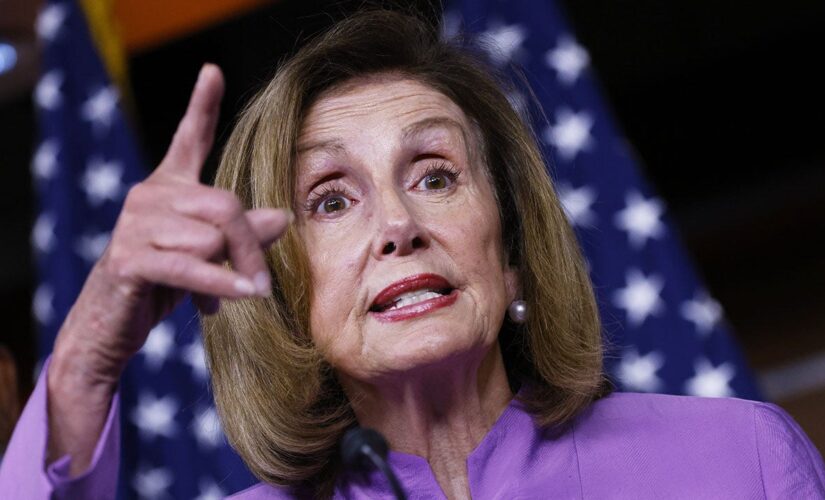NEWYou can now listen to Fox News articles!
House lawmakers are set to return to Washington on Tuesday, kicking off a hectic three-week legislative session by the end of which Congress must avert a government shutdown ahead of Sept. 30.
Congress is eyeing a short-term funding bill, known as a continuing resolution, that will keep the government open until early December, after Election Day.
The path forward is muddled, however, by President Biden’s request to include $22 billion in new coronavirus money and Senate Majority Leader Chuck Schumer’s insistence on tying the short-term funding measure to legislation streamlining the permitting process for oil and gas drilling.
Nearly a third of House Democrats warn that including the permitting portion is a non-starter.
House lawmakers are set to return to Washington on Tuesday, kicking off a hectic three-week legislative season during which Congress must avert a government shutdown ahead of the November midterms.
(Ting Shen/Bloomberg via Getty Images)
“In the face of the existential threats like climate change and MAGA extremism, House and Senate leadership has a greater responsibility than ever to avoid risking a government shutdown by jamming divisive policy riders into a must-pass continuing resolution,” said House Natural Resources Committee Chairman Ra?l Grijalva, D-Ariz., who is spearheading the opposition.
Schumer, D-N.Y., committed to passing the permitting bill by the end of September as part of a deal with Sen. Joe Manchin, D-W.Va. In exchange for passing the bill, Schumer secured Manchin’s support for the White House’s $739 billion climate change and tax hike package.
The side deal ensured Democrats were able to pass the larger tax and climate bill along party lines in the 50-50 Senate. Progressives are balking at the side deal, saying it was only between Schumer and Manchin.
Senate Majority Leader Chuck Schumer committed to passing the permitting bill by the end of September as part of a deal with Sen. Joe Manchin.
(Drew Angerer/Getty Images)
“Manchin went back on his word to get [Build Back Better] done, and we owe him nothing now,” said Rep. Rashida Tlaib, D-Mich.
The impasse is not the only one that threatens to derail the government funding bill. GOP lawmakers are similarly threatening to oppose any continuing resolution that includes additional funding for the coronavirus pandemic.
“In the spring, the administration told Congress that, without additional funds, it could not afford to purchase vaccines in the fall, yet somehow money was found to support the entire need,” said Rep. Tom Cole of Oklahoma, a senior Republican member of the House Appropriations Committee. “Rather than asking Congress for even more money now, it is high time for the administration to be fully transparent about funds spent and balances remaining.”
Biden is requesting Congress approve $22.4 billion in new coronavirus spending. Shalanda Young, the director of the White House Office of Management and Budget, said the money is needed to restart the administration’s program for sending citizens free at-home coronavirus testing kits.
President Biden is requesting Congress approve $22.4 billion in new coronavirus spending.
(Getty Images)
Of the more than $22 billion sum, $18.4 billion is earmarked for the Department of Health and Human Services. The other $4 billion is slated to go toward global efforts to contain and manage the virus.
Republicans say Congress should not approve any more coronavirus funding given that cases and hospitalizations are on the decline. They also note that the federal government still has billions in unspent funds that were allocated through Biden’s $1.9 trillion economic stimulus plan last year.
“The pandemic is over. Democrats’ wasteful spending and poor planning has our country on the cusp of a government shutdown, during a recession,” said Rep. David Schweikert, R-Ariz. “The notion that they would consider adding additional ‘COVID relief’ funding to a continuing resolution is beyond irresponsible.”
CLICK HERE TO GET THE FOX NEWS APP
Biden has also requested Congress approve $11.7 billion in military and economic assistance to Ukraine, $4.5 billion to combat the spread of monkeypox, and $6.5 billion in emergency disaster assistance. Although some Republicans are expected to raise concerns about the inadequate accountability measures in place for the Ukraine aid, enough bipartisan support is expected for passage.
Apart from the spending fights, significant political attention will also focus on the final hearings of the special committee investigating the Jan. 6, 2021, assault on the U.S. Capitol. The panel is slated to hold at least one hearing this month summarizing its findings.




